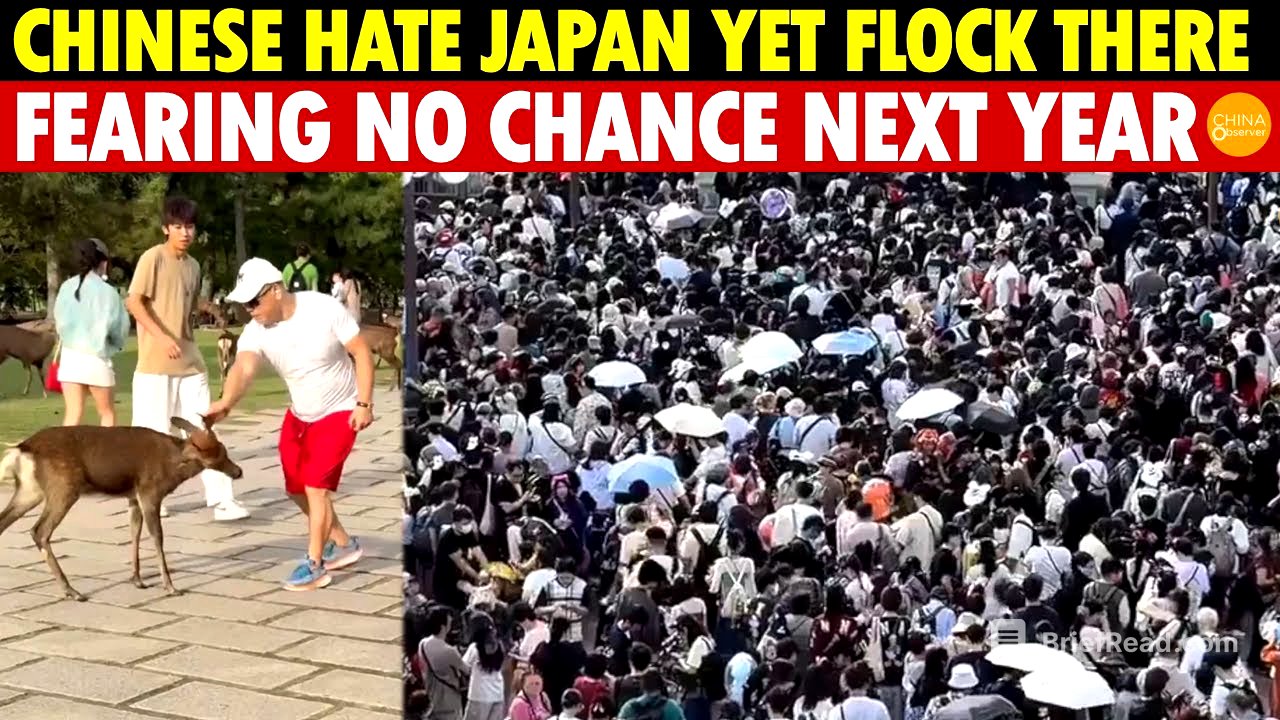TLDR;
The video explores the apparent contradiction between anti-Japanese sentiment promoted by the Chinese government and the continued popularity of Japan as a tourist destination for Chinese travellers. It examines the reasons behind this phenomenon, including dissatisfaction with domestic tourism experiences, food safety concerns, and the desire for duty-free goods. The video also touches on rising anti-Japanese sentiment and incidents involving Chinese tourists behaving poorly in Japan, as well as the Chinese government's control over information and its impact on public opinion.
- Despite anti-Japanese propaganda, Japan remains a top destination for Chinese tourists.
- Chinese tourists cite better experiences and safety in Japan compared to domestic travel.
- Incidents of poor behaviour by Chinese tourists in Japan are causing controversy.
- The Chinese government's information control is criticised for limiting people's understanding of the world.
Chinese Tourism to Japan Amidst Anti-Japanese Sentiment [0:00]
Despite the promotion of anti-Japanese films by the Chinese government, Japan remains a popular travel destination for Chinese tourists. Osaka and Tokyo are the top destinations, followed by Seoul, Hong Kong, Singapore, and Bangkok. Chinese tourists are drawn to Japanese food, landmarks, and culture, with commercial streets and shopping centres in Japan being particularly crowded.
Reasons for Choosing Japan Over Domestic Travel [0:47]
A Chinese blogger shared a positive travel experience in Japan, highlighting the large number of Chinese tourists present. The blogger explained that many Chinese people choose to travel to Japan due to negative experiences with domestic tourism, including overcharging, food safety concerns, and random fines. Japan offers a more enjoyable and hassle-free experience, along with the opportunity to purchase duty-free goods.
Hypocrisy and Conflicting Views on Japan [1:59]
Chinese media reported a significant increase in tourists travelling to Japan during the National Day holiday. This contrasts with the promotion of patriotic films that incite anti-Japanese sentiment, even among children. Some netizens have pointed out the hypocrisy of praising anti-Japanese films while simultaneously enjoying travels in Japan. Others argue that those who hate Japan and those who visit Japan are two different groups.
Economic Factors and Concerns About the Future [3:54]
Some question who can afford to travel to Japan, given economic struggles in China. It's suggested that travellers are mostly government employees, those with connections, or wealthy families. Concerns are also raised about whether Chinese people will still be able to travel to Japan in the future, given the election of a Japanese politician known for her tough stance towards the Chinese Communist Party (CCP).
Incidents Involving Chinese Tourists and Animal Cruelty [5:30]
Videos of deer being abused in Nara Park have surfaced, with some accusing Chinese tourists of animal cruelty. The newly elected Japanese politician mentioned the mistreatment of deer by foreign tourists, likely referring to Chinese visitors. An incident of a Chinese tourist hitting a fawn went viral, tarnishing the image of Chinese people. While some defended the man's actions, others criticised the behaviour.
Cultural Differences and Poor Behaviour [7:18]
It's suggested that the poor behaviour of some Chinese tourists abroad is a result of the destruction of traditional culture during the Cultural Revolution and the rise of a "wolf warrior" style of party culture. This behaviour is seen as tarnishing the image of Chinese people and causing shame for overseas Chinese who uphold traditional values.
Prohibited Items and Cultural Clashes [7:59]
A large number of Chinese tourists have been found carrying prohibited items like beef and fruit at Japanese airports. Some tourists have reacted defiantly when confronted by quarantine officers. Additionally, an incident occurred at an anime expo in China where a cosplayer dressed as a character from a Japanese anime was bullied for being "pro-Japanese."
South Korea as a Tourist Destination and Labour Market [11:12]
South Korea is also a popular tourist destination for Chinese people, with the South Korean government recently allowing visa-free entry for Chinese tourists. However, this policy has faced protests from conservative groups. Many Chinese have also gone to South Korea to find work due to China's economic struggles. A Chinese woman in South Korea praised China's economy and political system, despite working in Korea for economic reasons.
Information Control and the CCP's Influence [12:38]
The mindset of many Chinese people has been altered by the CCP, leading them to criticise foreign countries while still working or travelling abroad. A conversation between a Vietnamese woman and a Chinese "little pink" reveals differing views on internet censorship and information control. The "little pink" defends the CCP's filtering of information as a form of protection, while the Vietnamese woman questions whether it is a form of confinement.
Critique of Information Control and the CCP [14:49]
A Malaysian blogger criticised the "little pink's" defence of information control, arguing that it prevents Chinese people from thinking for themselves. The blogger stated that the CCP considers any criticism of China to be false information. It's argued that in the free world, people can distinguish between true and false information, unlike those who rely on the CCP to spoon-feed them the news. Wealthy and well-educated Chinese people are trying to escape the control of communism for their children's future, while those who support communism online are often less educated or motivated by financial gain.









